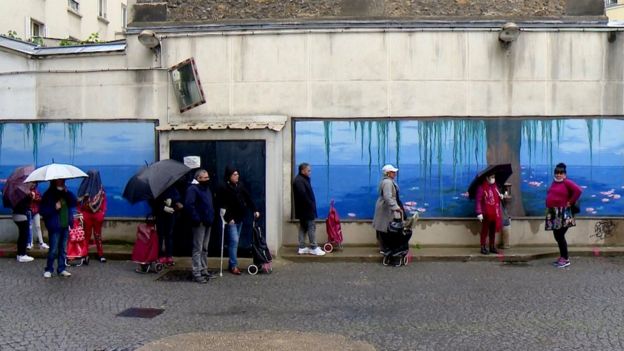Lockdown bites poor as France eases grip
Behind a faded door, in a
side-street near Montmartre, a long straggly queue is starting to form.
In Paris under lockdown, hotels and restaurants may be deserted but food
banks are getting busier.
Women with pushchairs, men with umbrellas, everyone a metre apart; there's very little talking. The government will set out on Thursday how it plans to lift restrictions on movement on Monday. But for many the damage from one of Europe's strictest lockdowns has been done.
This centre, one of a network run by the charity Les Restos du Coeur (restaurants of the heart), saw a 40% rise in subscriptions last week.
Director François Coadour expects the numbers to keep rising and says the profile of his clients is changing.
"We have workers, precarious workers, people who were moonlighting, and part-time workers," he told me. "These are people we didn't see before."
Clients here used to choose their own food from the shelves inside the centre; now they're simply handed a bag of goods through an open door.
meet a young woman waiting in the queue, who introduces herself as Madame Ouattara.
Even behind her mask, her face wears a gentle smile. She tells me she began coming here last month after the lockdown left her husband out of work. They ate through their savings in weeks.
What will happen to France's economy?
France's biggest economic players have also been badly hit by coronavirus: tourism, construction and manufacturing in particular.The economy shrank by almost 6% in the first part of this year.
Philippe Martin, an economist at the prestigious Sciences-Po University and an adviser to President Emmanuel Macron, says the construction industry in France was hit more harshly than in other heavily confined countries such as Italy, and that conditions for restarting work were also tougher here.
But he also questions whether financial support packages offered by the government, such as "partial unemployment benefit", may have helped to slow the economy too: "Because this system was quite generous," he said, "it may have pushed some firms to close down, rather than keep trying to produce, because the full wages were paid by the [government]."
Others believe the high losses felt by France are a sign of its efficiency in policing the lockdown.
The impact on the future economy here is likely to be severe - the worst recession since World War Two, as the government put it.
It's also expected to hit Italy, Spain and Greece very hard.
Germany and Austria, meanwhile, seem to have escaped relatively lightly, leading some to question whether this crisis could create fatal cracks in the eurozone.
Jean-Claude Trichet, who ran the European Central Bank during the last financial crisis, says he's been through this kind of "stress test" before: "I was permanently told, 'You will explode the euro, it will evaporate, the euro area will disappear,'" he said.
"We did not disappear, as you know, but on top of that, four new countries decided to enter the euro area after [the collapse of] Lehman Brothers. The resilience of this historical project is very, very high, and I am absolutely convinced that will prove true in the future."
https://www.bbc.com/news/world-europe-52557722





Post a Comment